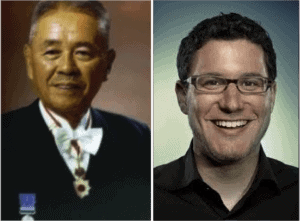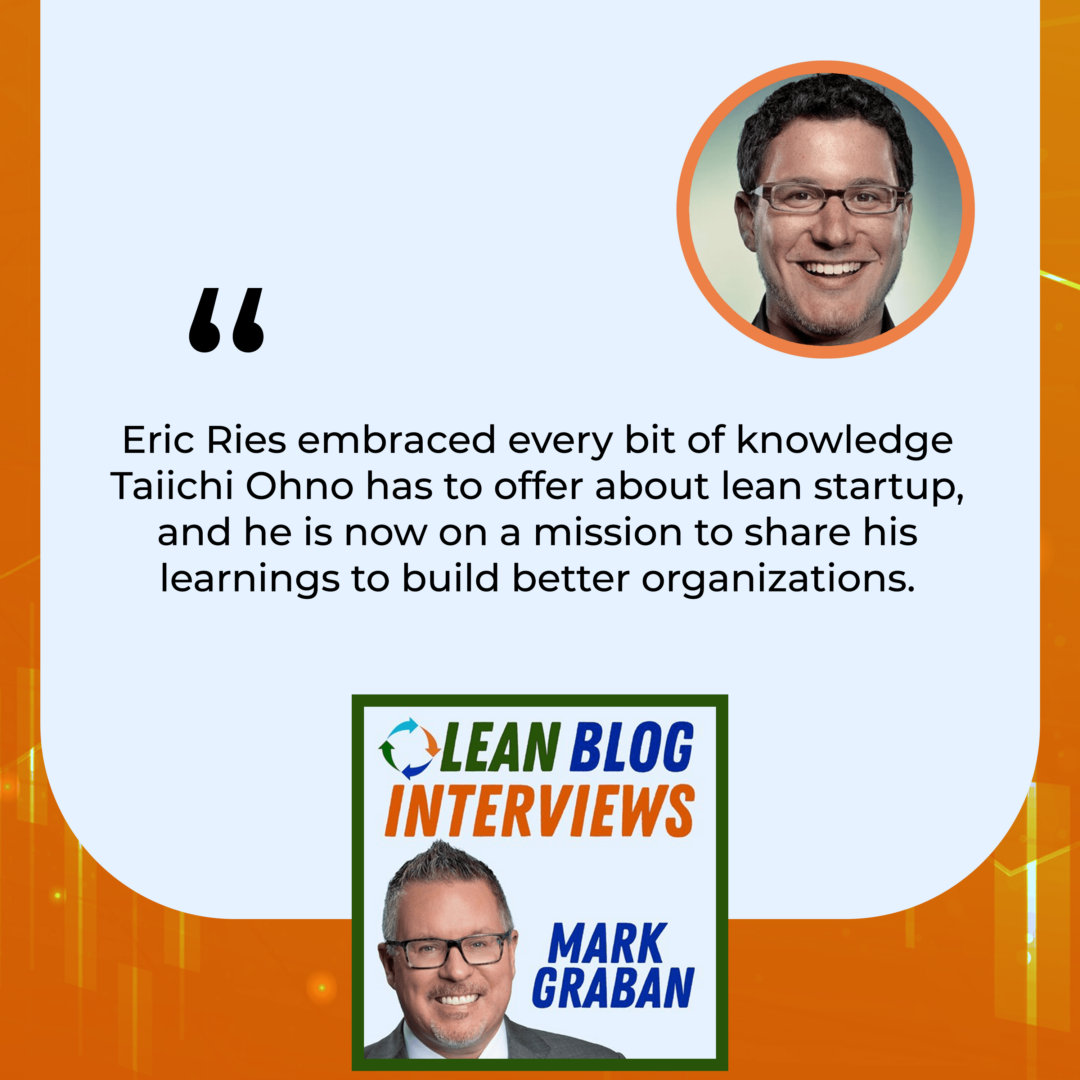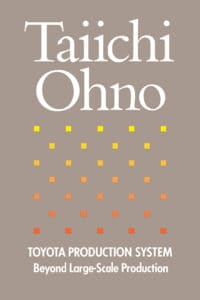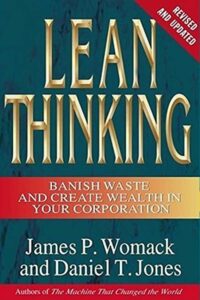Episode #142 brings us a returning guest (#115), Eric Ries, author of the best-selling book The Lean Startup: How Today's Entrepreneurs Use Continuous Innovation to Create Radically Successful Businesses.

In the book, Eric cites the work of Taiichi Ohno, including the “5 Whys” problem-solving approach. In this podcast, Eric shares his story about finding Ohno's work (including the Lean classic Toyota Production System: Beyond Large-Scale Production) and how it has influenced his work with startups.
For a link to this episode, refer people to www.leanblog.org/142.
For earlier episodes, visit the main Podcast page, which includes information on how to subscribe via RSS or via Apple Podcasts.
If you have feedback on the podcast, or any questions for me or my guests, you can email me at leanpodcast@gmail.com or you can call and leave a voicemail by calling the “Lean Line” at (817) 993-0630 or contact me via Skype id “mgraban”. Please give your location and your first name. Any comments (email or voicemail) might be used in follow ups to the podcast.
Listen to the podcast here
Eric Ries On How Taiichi Ohno's Ideas Shaped The Evolution Of Lean Startup

We have a great guest. He is Eric Ries, the author of the book, The Lean Startup. He was previously a guest on Episode 115, which you can access by going to LeanBlog.org/115, or you can find it through iTunes and the other podcast directories. We're going to be talking about Eric's reflections on the work of the great Taiichi Ohno, one of the fathers of the Toyota Production System. Eric is joining us as Norman Bodek did in Episode 141 to share how Mr. Ohno‘s work impacted him and helped in his development of The Lean Startup methodology. As always, I want to thank you for reading.
—
Joining us again is Eric Ries, the author of the book, The Lean Startup. Thanks for joining us, Eric.
Thanks for having me.
As we're past what would have been the birthday of Taiichi Ohno, one of the fathers of the Toyota Production System, I wanted to get your thoughts because you cite Mr. Ohno a few times in your book. I‘m curious. How did you get introduced to his work? How did it influence you?
It has been incredibly influential. I would go so far as to say it has changed my life. It's a coincidence. It's a funny thing how these things work. To set the stage a little bit, I founded a company called IMVU in 2004. I was into a lot of the ideas that are called Agile Software Development, which have their origins in lean, but in a lot of the works I had read about them, Toyota was not specifically mentioned. Lean principles were not mentioned. I didn't know the theory of lean or anything like that. I knew nothing about manufacturing.
To be honest, I've never set foot in a manufacturing plant in my whole life. I have no idea how any of that will be relevant to me, but I had this intuition that we should be going a lot faster in a startup and doing practices that even in the agile world were considered a little bit extreme. We have had the chance to talk about them on other occasions. They're things like continuous deployment. Putting software in customers' hands is much faster than was previously considered possible.
I had this problem. I had no way to explain to anybody why that was going to work. People would look at me like I was completely crazy. I could see that it was working because I was very stubborn, and I had this intuition. I said, “We're going to do it no matter what.” It was working, but we're always hiring new employees. The company is growing. We're bringing on investors. We had investors that when they were doing their due diligence for the company pulled out because they didn't like the answers I was giving them about how we built the technology.
They would bring their experts trained in more traditional software development methodologies and be like, “This kid is crazy. He doesn't know what he's talking about. This is not the way it's done.” This is a continuous point of stress for me and my co-founders. You have to remember. At the time, I was by far the youngest person on the team. I was often younger than the employees I was hiring and training in this method. It's not like it was an easy situation to be in, but I believed it was right.

I was reading everything I could get my hands on for ideas, “First of all, was I right? Was it a fluke? If it was right, how could I possibly explain it?” I had read some business school cases about Toyota. I was a little bit familiar with it. There was a thing called Toyota Production System. That's all I knew. I figured I should be educated about it. I go on Amazon and type in Toyota Production System. Lo and behold, this book by Taiichi Ohno comes up called Toyota Production System. I said, “It must be the definitive guide to setting up the Toyota Product System.”
I got this book. I'm holding it in my hand. I found my copy. You've read the book. It is a very wise, humane, and philosophical treatise on how to run a business. As a practical manual for setting up a factory or doing any other task, it's not exactly your step-by-step guide. I remember having this feeling that I was reading something crazy. It's Zen mumbo jumbo about autonomation, automation with a human touch, and all this stuff.
There's that one passage about five whys in there. All of a sudden for whatever reason, there's that little section where he talks about trying to get to the root cause of problems by asking why. He has a few examples of a machine with a strainer incorrectly attached. I have an idea of what that looks like. I've never seen a machine strainer in my whole life, but somehow his very humble and analytical approach was like a lightning bolt to me.

I said, “I can do that. That's going to solve a huge class of problems that I have in my life where I'm constantly fighting with people about prevention. When something goes wrong, do we blame the person? Do we blame the computer? Do we fix that problem? Do we try to solve that whole class of problems?” That was super helpful. That was one of the first times I learned to see the work that I was doing and the management that I was doing as a system that needed engineering and debugging like the software I was used to writing.
The idea of the five whys is so impactful. You expand on this in The Lean Startup and everything you're teaching. Did that become a helpful reference point to talk about Ohno and Toyota? How do people in software companies or startups react to, “Here goes Eric talking about this Toyota guy.”

People were looking at me like I was completely nuts. To be fair, it's not just Ohno's book but a lot of others that were very helpful. I didn't make a lot of progress. I got some engineers to adopt the five whys, but that was as far as I got until I read Lean Thinking and that series of books, The Machine That Changed the World, and the books that have been specifically written for American managers breaking it down in a lot more detail and putting the pieces together, not in the Zen style but in a much more Western analytical style.
Even then, a lot of people would come to me with a software problem, and I would start talking to them about batch sizes, die stamping, and stuff. You have to remember that my ability to explain a die-stamping machine is very limited because I've never seen one. I don't understand what it does. The funny thing that happened to me was after that, we were able to get clear wins by changing batch size, doing five whys especially, and adopting some of these practices.
It was later that I came to appreciate that I had started with Ohno's book. I went back and read it again. I felt like I had his voice in my head in a lot of situations where my first instinct would be to blame somebody or not investigate something for myself but assume that somebody else had it figured out. The idea that your organization has an autonomic nervous system and that it needs to be able to do the right thing automatically without people having to expend heroic effort, those kinds of ideas, or that philosophical approach was there with me all the time. When you reached out to celebrate his anniversary, I thought, “What an awesome opportunity to reflect on the wisdom that he represented.”

I've learned a great deal from Sami Bahri who is a fantastic dentist in Jacksonville, Florida. He was a similar pioneer to the work you've done because he wanted to apply the idea of lean to his dental practice. He didn't have a book to read about lean in dentistry. He went and read the books by Ohno, Shingo, Womack, and others and very much had to synthesize his approach that would make sense. It's fascinating to see where Mr. Ohno‘s work has touched people in different industries, including yourself.
I'm flipping through the book as you're talking because I was remembering. His simple formula is something like, “Present capacity equals work plus waste.” If you've never thought to think of the system in that specific way, I don't think there's anything intuitive about it. I don't know anybody who can frame that as a matter of intuition, but once you have that framing in your mind, it's a testament to what a good idea is. You cannot let it go. You can't see any work.
Present capacity equals work plus waste. If you've never thought to think of the system in that specific way, there's nothing intuitive about it. Share on XMy family was sick and tired of me because we couldn't go to a restaurant without me being like, “They should be using kanban on the line. What are they doing?” There's the grocery store analysis and all that stuff. It changes your sense of what is intuitive or what naturally makes sense. I'm looking forward to reading this again. I'm going to go back and see what other wisdom I haven't yet come to understand.
It's fun to go back and revisit. I would love to help fix that problem where you've never visited a factory. Maybe we can line something up. We're going to find a sponsor in your neighborhood, or if you're back in Texas, let's go down to the Toyota San Antonio plant.
I would love to do that sometime.
I'll give you some context for what you've read. Hopefully, you will be rereading it. I want to thank you. Thanks a lot, Eric, for sharing some of your recollections and thoughts here. We celebrate what Mr. Ohno brought to the world and what we would call the lean or now through your work and others‘ lean startup methodology. Thanks for taking the time to talk about that.
I appreciate it. I feel honored to even be in the same chain of thinking as him. Thank you for your leadership on this issue. Thanks for your support.
Thanks.
Important Links
- The Lean Startup
- LeanBlog.org/115 – Previous Episode
- Norman Bodek – Previous Episode
- Toyota Production System
- Lean Thinking
- The Machine That Changed the World
- Sami Bahri – Previous episode
- LeanPodcast@gmail.com
What do you think? Please scroll down (or click) to post a comment. Or please share the post with your thoughts on LinkedIn – and follow me or connect with me there.
Did you like this post? Make sure you don't miss a post or podcast — Subscribe to get notified about posts via email daily or weekly.
Check out my latest book, The Mistakes That Make Us: Cultivating a Culture of Learning and Innovation:










